- Home
- Andrew Marr
The Making of Modern Britain
The Making of Modern Britain Read online
THE MAKING OF MODERN BRITAIN
Also by Andrew Marr
MY TRADE
A Short History of British Journalism
A HISTORY OF MODERN BRITAIN
Andrew Marr
THE MAKING OF MODERN BRITAIN
MACMILLAN
First published 2009 by Macmillan
This electronic edition published 2009 by
a division of Macmillan Publishers Limited
20 New Wharf Rd, London N1 9RR
Basingstoke and Oxford
Associated companies throughout the world
www.panmacmillan.com
ISBN 978-0-230-74718-0 in Adobe Reader format
ISBN 978-0-230-74717-3 in Adobe Digital Editions format
ISBN 978-0-230-74719-7 in Mobipocket format
Copyright © Andrew Marr 2009
The right of Andrew Marr to be identified as the author of this work has been asserted by him in accordance with the Copyright, Designs and Patents Act 1988.
The acknowledgements on page 452 constitute an extension of this copyright page.
You may not copy, store, distribute, transmit, reproduce or otherwise make available this publication (or any part of it) in any form, or by any means (electronic, digital, optical, mechanical, photocopying, recording or otherwise), without the prior written permission of the publisher. Any person who does any unauthorized act in relation to this publication may be liable to criminal prosecution and civil claims for damages.
A CIP catalogue record for this book is available from the British Library.
Visit www.panmacmillan.com to read more about all our books and to buy them. You will also find features, author interviews and news of any author events, and you can sign up for e-newsletters so that you’re always first to hear about our new releases.
For Jackie
Contents
Preface ix
Part One
LIVING IN THE FUTURE
1900–1914
Part Two
THE MEANING OF HELL
1914–1918
Part Three
KEEPING OUR BALANCE
1919–1939
Part Four
THROUGH FIRE, A NEW COUNTRY
1939–1945
Notes
Acknowledgements
Index
Preface
This new book comes both before and after. I wrote it after my History of Modern Britain, which ran from the austerity years at the end of the Second World War to the current time – from Grey to Brown. Here, I describe the near half-century before that. Those forty-five years, short enough, were crammed, almost modern, and tragic. They include the Edwardian age, which was one of the most interesting periods in all British history, both world wars, and the wild roller-coaster ride of the twenties and thirties. This was the time when modern Britain was born. We had been one thing – an empire – and became another – a democracy. At the time few people realized how incompatible the two things are. We moved from living in Britannia, with her king-emperors and grand landed aristocracy, a place where most people could not vote, and found ourselves in Britain, a northern welfare state in the shadow of the United States. On the way, millions of people struggled with the dilemma of how to live a good life. It was a time of new technologies, political uproar and fights about class and sex. It was a time of fools and visionaries and heroes – sometimes, as in the case of Winston Churchill, whose spirit stalks these pages, all of them wrapped up in a single life.
Looking back, we learn to see ourselves more sharply. Our forebears were living on the lip of the future, just as we are. Their illusions about what was to come should make us, right now, a little humble. They were tough, passionate and young, however ancient they seem now. They worried about sleaze, told bad jokes, liked films and fatty foods, and occasionally rose to greatness when tested by terrible times. Inevitably, the two world wars overshadow much of the life around them. In recent years both have been reassessed, quite roughly. For many the Great War was converted from a significant national triumph to an inhuman and pointless disaster. Some say that by paving the way for Lenin, Stalin and Hitler, it was one of the great failures of humankind. The Second World War is now being almost as radically reassessed. Did we really have to fight it? Would Hitler not have softened into a non-genocidal if autocratic leader had Britain done a deal in 1940? Perhaps there would have been no Holocaust, the Empire would have slowly evolved into a federation of democracies and, because the United States would have stayed away, there would have been no Cold War, with its threat of global annihilation, either? Since Britannia’s role in the opening stages of both world conflicts was pivotal, these are clearly huge questions about the role of the British in modern times.
No one can be sure about the lost futures that vanished with paths not taken. But the Kaiser’s German empire was an expansionist military regime, with little real parliamentary safeguard, which was intent on dominating Europe. It offered an alternative version of modernity, a powerful autocratic one, which came very close to triumphing. The future for Europeans would not have been either peaceful or democratic had the German armies broken through in 1914, or in 1918. Certainly, the fate of the colonized around the world would not have been pleasanter. Had Britain succumbed in 1940 to the Nazi offer – keep your empire and we will keep Europe – then there is no evidence that Hitler would have renounced his obsessive desire to sweep Jewry from Europe. Nor is there much evidence that he would have kept his word. He would have been in a better position to defeat Stalin, it is true; yet a longer, even bloodier conflict would surely have followed, since a total German invasion of European and Asian Russia seems impossible. Atomic weaponary would have become real inside Germany, at least as quickly (probably more quickly) as it did at Los Alamos.
And the British? Linked to a fading imperial past but without the markets or industry to sustain or protect the old glory, we would have crumbled into a vassal state, one act of appeasement followed by another, as Churchill predicted. There would have been no Atlantic alliance and America would have gone her own way, probably forced to accept a world divided into zones of influence – Nazi, Russian, Japanese and so on. For all the horrors of the past century, this does not seem an appetizing alternative. So, for this writer, the wars for the protection of democracy were real conflicts, which could not have been side-stepped and which, once begun, had to be won.
My last book described what I called with only some journalistic flippancy the defeat of politics by shopping. That is, the ideologies were trounced by consumerist materialism. It takes a lot of politics, of course, to set up and maintain a market-dominated and market-mimicking way of life. It was not inevitable; there were other roads not taken. This book describes what happened before the triumph of the market, or ‘shopping’, when it seemed the world would be shaped by politics. It was no paradise. If these were the decades when modern Britain was born, it was a bloody and painful birth. The people whose blood was spilt and who experienced the pain looked different from us, smelt different and thought differently. But in the majority of cases they were our close relatives. Their idealism, their mistakes, even their hobbies and entertainments, have plenty to teach us still.
Like the previous book, this one accompanies a BBC2 television series. In both cases, I wrote the book first, relying on my own research – and so the mistakes really are mine. Then, working with friends and colleagues, we reshaped the material to form the documentaries. The films and the book are not the same, however. There are many stories, judgements and characters in these pages that do not appear on screen; and there are a few points covered in the TV series that are not described here, usually because they were highlighted b
y one of the directors or researchers. But this was written as a book, not as something to accompany something else. My only guiding principle is that I have kept in what is most important, and what interested me most. The last few years have been grim ones for patriotic people in Britain, when our politics have seemed embarrassing and we have almost drowned in a dirty puddle of mutual recrimination. The past was not so totally different; what we need most is perspective. My dream is that by returning to our not-so-distant history, I might remind readers why, with all its faults, this is a lucky place to be living in, and one we can be quietly proud of.
Andrew Marr
June 2009
Part One
LIVING IN THE FUTURE
1900–1914
Don’t worry, darlin’
No baby, don’t you fret
We’re livin’ in the future,
And none of this has happened yet
Bruce Springsteen,
‘Livin’ in the Future’, 2007
Edwardians: the Shock of the Familiar
They are very far, and strangely near. Almost nobody is still alive who remembers Edwardian Britain. To that extent, it has become proper history. Its rigid class distinctions, its imperial pride, its strange ideas – from theosophy to racial purity – are the vivid coral of a lost world. Few of us would feel at home there for any length of time. Every town had places where the children were literally shoeless and where people were withering (not growing fatter) from malnutrition. The smells of the town included human excrement and unwashed bodies, along with tobacco, beer, coal smoke and the rich reek of horse. Child prostitutes were readily available on busy streets. The largest single group of the employed were not factory workers but domestic servants. Every middle-class household had a maid, or maids, a cook, and often a gardener or groom. Class distinction was not an abstract thing, but present in most houses, standing quietly in the room.
Today we still read one another instantly by clothing. A Barbour jacket means one thing, a hoodie another. Everyone can spot a cheap suit bought for that first job. But in Edwardian Britain the distinctions of dress were sharper and harsher. A shopkeeper’s assistant without a tail-coat could not stroll along the seafront promenade on a Sunday. An aristocrat seen wearing a coloured tie with a morning coat was angrily rebuked by his monarch. Respectable women always wore hats and gloves when outdoors. Gaiters, top hats with ribbons, pantaloons, three-inch boiled collars all sent messages, meaning drayman, bishop, suffragist and ‘masher’. For the poor there was no state welfare, just charity relief or the threat of the dreaded workhouse. Union flags billowed above the buildings. Race destiny was accepted by nearly everyone. We have a state. They had an empire.
The streets were crowded, as they are now, and noisy. But the omnibuses were horse-drawn, the carts and hansom cabs likewise, and the noise was of hooves, neighing, whips and cursing. Bicycling was popular and there were a few cars, regarded with amusement or suspicion as they passed, driven by people dressed, in the words of one observer, like ‘a cross between an overgrown goat and a doormat’. The first fatal accident involving a pedestrian and a car is generally reckoned to have happened in the Lower Shoreham Road in Hove, Sussex. The car was doing a dangerous 8 m.p.h. Crime was, by today’s standards, remarkably low. Yet anyone could walk into one of numerous shops and buy a revolver. The fashionable Webley-Green could be had blued or in nickel plate, with an ivory or mother-of-pearl handle. Edwardian Britain was an armed country, even after the Pistols Act of 1903 thoughtfully banned sales of handguns to people under eighteen or ‘drunken or insane’. In the ‘Tottenham Outrage’ of 1909, police chasing a gang simply picked up four pistols from passers-by for the pursuit; other armed citizens joined in. Regional accents were much stronger, suspicion of foreigners much more intense. As George Orwell noted later, Chinamen were sinister and funny too; Africans simple-minded; Indians loyal, or alternatively treacherous. There was music everywhere, but it was live and not recorded, tinkling out of pubs or being lustily sung in the open air. Yet the air of the cities, at least, was rarely open. Thick palls hung over industrial Yorkshire, the Clyde and London. When the 1906 Liberal government won its landslide victory and the new cabinet ministers were summoned to see the King, they could not find their way back from Buckingham Palace in the fog and had to feel past rows of horses with their hands.
Yet in so many other ways, Edwardian Britain confronts us with the shock of the entirely familiar. If you walk through most British town centres and look only in front then, yes, the Edwardians and Victorians have gone. The old specialist shops with tradesmen’s bicycles outside and the freshly scrubbed steps have been replaced by large glass chain-store frontages and a glut of metal, parked or crawling cars. But raise your gaze by a few degrees and often you find they are still with us. There are the elaborate brickwork upper storeys, fake turrets, old chimneys, faded shop signs, dates, spires and elaborate windows, evidence that these buildings were originally erected by craftsmen before the First World War. When they first went up, on wooden scaffolding ringing to the sound of Irish voices, the people who moved in were, like us, fascinated by celebrity gossip which they devoured in cheap newspapers and the popular magazines. They ate fish and chips and drank quite a lot, even by our standards. Though sex outside marriage and illegitimate children were matters to be ashamed of, there was plenty of sexual tension in the air. The upper classes and working classes behaved in ways that horrified the middle, who followed awful murders, worried about the unruly young and argued about divorce, state pensions, socialism and unemployment much as we do. In the new luxury variety halls and huge theatres, working-class culture had seized the imagination of the middle classes too, with sentimental songs, magicians, dancers, entertainers, infuriatingly hummable tunes and bad jokes – very much as happened when television culture arrived sixty years later. They were also great club-formers, creating endless leagues and associations, including many of today’s football and other sporting clubs.
As now, the middle classes looked to science to make life easier, and to save the world from possible calamities ahead. In the first Illustrated London News of 1901, various eminent scientists were asked to give their predictions about the new century. Sir Norman Lockyer explains that studying sunspots will enable people to forecast the weather, tackling ‘famines in India, and droughts in Australia’ long in advance. Sir W. H. Preece, co-inventor of the wireless telegraph, thinks that ‘the people of 2000 will smile at our achievements as we smile at those of 1800’ but warns that wireless communications have no further to go and is dubious about whether man will really fly through the air. Sir John Wolfe Barry, the engineer of Tower Bridge, believes we will see wave power and hydro-electric power in the twentieth century; though he also predicts ‘moving platforms’ above and below the streets to ease congestion. Sir William Crookes suspects telephones will become popular, and is interested in ‘radium’ as a new source of energy – predictions which he rather spoils by suggesting that all London will be covered by a large glass lid to deal with the weather. Sir Henry Roscoe, president of the Chemical Society, believes the ‘annihilation of distance’ cannot be carried much further in the twentieth century: ‘The Atlantic voyage, for instance, which we can now accomplish in five days, is not likely to be reduced to one.’
If the scientists were hit and miss about the future, the political visionaries were mostly miss. There was a general assumption, which extended to self-proclaimed radicals and liberals, that the Empire would continue to be huge while government would be small. Income tax had shot up, because of the Boer War, to the unseemly figure of a shilling in the pound – that is, 5 per cent. The war had increased public spending as a percentage of national income to nearly 15 per cent. It would fall towards 10 per cent until the First World War sent it rocketing to levels closer to those of the 1970s. The reformed and quite efficient civil service stood at around 116,000 (500,000 now, despite computers) though it would double in size in the Edwardian period. The House of
Lords was still the cockpit of aristocracy and the prime minister sat there, not in the Commons – though Lord Salisbury would be the last British leader to do that. The richest peers lived on a scale barely comprehensible even after the age of hedge-fund managers and internet moguls. They had hundreds of personal servants. One had a private army, another a large private orchestra which travelled abroad with him. At Chatsworth, 300 torchbearers stood on the main avenue to welcome royal visitors. In London, the great ducal town houses were more like the palaces of lesser continental monarchs. Yet the wealth of the industrialists and financiers had eaten deeply into the landed gentry, diluting the old aristocrats. Their handbook, Debrett’s Peerage, was vastly swollen by new baronets. In the Commons, the party of the left, the Liberals, was still dominated by aristocrats or by commoners who had done so well they sounded like aristocrats. There were barely any working-class MPs.
The greatest crisis at the start of the century was the South African War, in which a struggling British army was trying to exert imperial domination over small Dutch-speaking republics. At home it uncorked a fizz of patriotism, with city workers queuing to sign up as volunteers, noblemen financing their own detachments, and all kinds of adverts taking on a military theme. Drab khaki (the word comes from an Indian one for dust), which had replaced easy-to-hit scarlet as the British army’s field colour, was being worn by fashionable women. When the isolated town of Mafeking was eventually relieved, the scenes of rejoicing were so exuberant that ‘mafficking’ became a word meaning, roughly speaking, to go wild in public. When Winston Churchill escaped from Boer captivity, the papers had a field day and the music halls satirized the bumptious young man. Yet all this enthusiasm could not hide the fact that Britain fought ineffectively at first, and then only achieved her victory by brutal new strategies, which made other Europeans shiver with detestation.

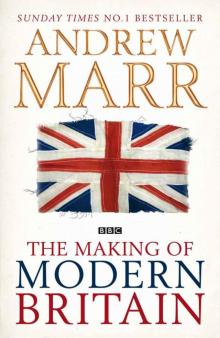 The Making of Modern Britain
The Making of Modern Britain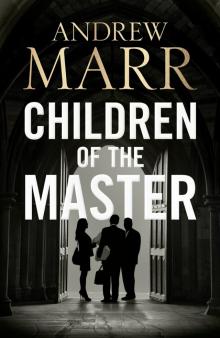 Children of the Master
Children of the Master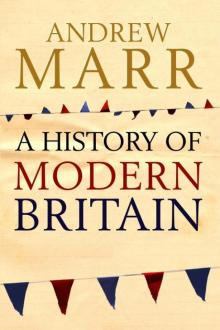 A History of Modern Britain
A History of Modern Britain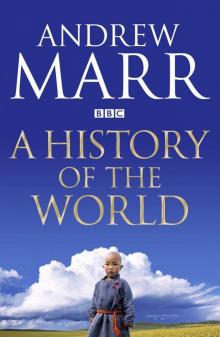 A History of the World
A History of the World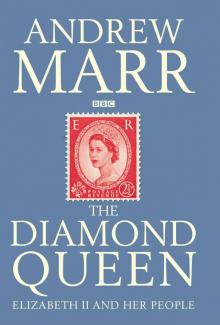 The Diamond Queen
The Diamond Queen